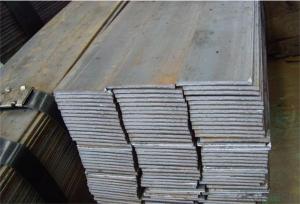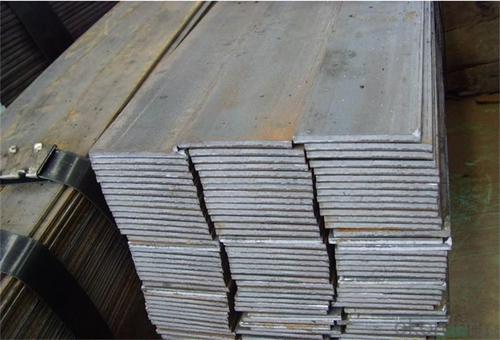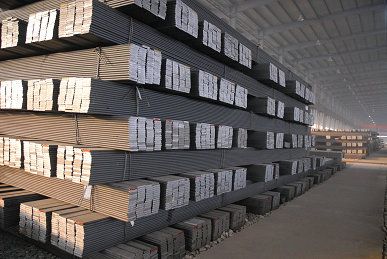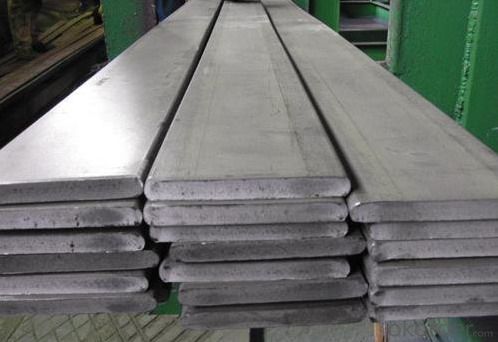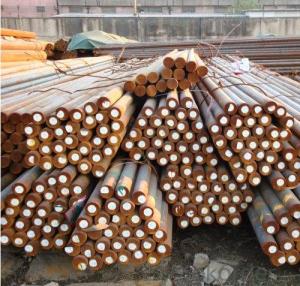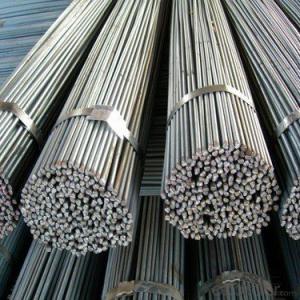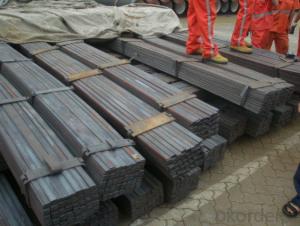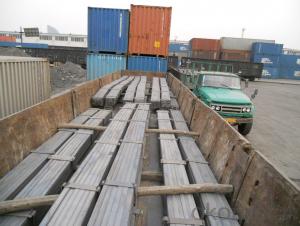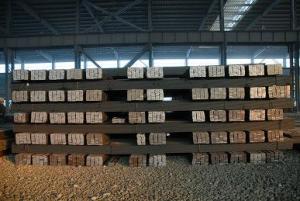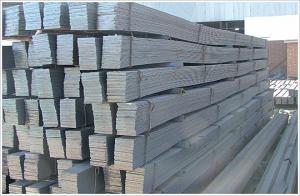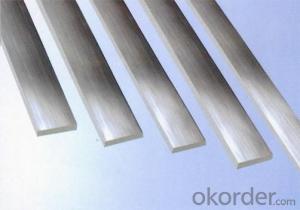Spring Steel Flat Bar
- Loading Port:
- China Main Port
- Payment Terms:
- TT or LC
- Min Order Qty:
- -
- Supply Capability:
- -
OKorder Service Pledge
OKorder Financial Service
You Might Also Like
Product Description:
OKorder is offering high quality Steel Flat Bar at great prices with worldwide shipping. Our supplier is a world-class manufacturer of steel, with our products utilized the world over. OKorder annually supplies products to European, North American and Asian markets. We provide quotations within 24 hours of receiving an inquiry and guarantee competitive prices.
Product Applications:
Steel Flat Bar are ideal for structural applications and are widely used in the construction of buildings and bridges, and the manufacturing, petrochemical, and transportation industries.
Product Advantages:
OKorder's Steel Flat Bar are durable, strong, and resist corrosion.
Main Product Features:
· Premium quality
· Prompt delivery & seaworthy packing (30 days after receiving deposit)
· Corrosion resistance
· Can be recycled and reused
· Mill test certification
· Professional Service
· Competitive pricing
Product Specifications:
Commodity: Mild Steel Flat Bar
Standard: GB;JIS
Material: Q195-235;SS400
Origin place: China
Thickness: 3mm-30mm
Width:20mm-200mm
Length: Max 12m
Certification: SGS/BV
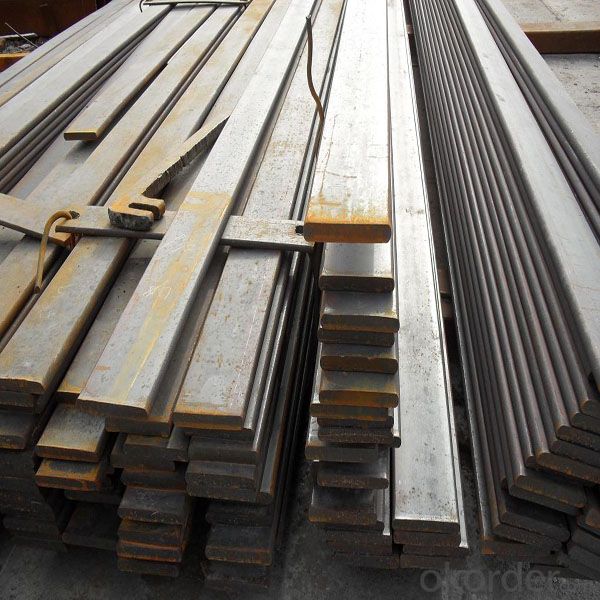
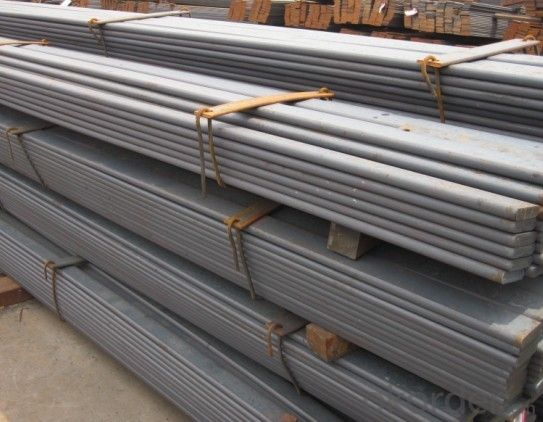
Usage/Applications of Steel Flat Bar
Widely used for construction, Machinery manufacturing, Iron tower steel structure, Shipbuilding; Steel grating, Staircase, Bridge, Viaduct, Railway spare parts, Boilers making etc.
Packaging & Delivery of Mild Steel Flat Bar
Packaging Details: The Mild Steel Flat Bars are packed in bundles and loaded in 20 feet/40 feet container, or shipped by bulk cargo ,also we can do as customer's requirements.
Delivery Details:30~45 days upon the receipt of buyer payment by T.T. or L/C.
Production Flow of Steel Flat Bar
The Mild steel flat bar is made through three processes:
1.Feeding the material: Feeding the row material (the steel plate) to Slitting Line.
2.Slitting:The steel plate would be slitted into expected width by lengthways cutter.
3. Leveled and cutting: The plat bar would be ground into level by the grinder and then cut into required length
FAQ:
Q1: Why buy Materials & Equipment from OKorder.com?
A1: All products offered byOKorder.com are carefully selected from China's most reliable manufacturing enterprises. Through its ISO certifications, OKorder.com adheres to the highest standards and a commitment to supply chain safety and customer satisfaction.
Q2: How do we guarantee the quality of our products?
A2: We have established an advanced quality management system which conducts strict quality tests at every step, from raw materials to the final product. At the same time, we provide extensive follow-up service assurances as required.
Q3: How soon can we receive the product after purchase?
A3: Within three days of placing an order, we will begin production. The specific shipping date is dependent upon international and government factors, but is typically 7 to 10 workdays.
- Q: How does special steel contribute to the chemical processing industry?
- Special steel contributes to the chemical processing industry by offering exceptional resistance to corrosion, high temperatures, and pressure. It is used in the production of various equipment such as valves, pipes, reactors, and heat exchangers, ensuring the safe and efficient handling of corrosive chemicals. Additionally, the unique properties of special steel enable the construction of durable and reliable structures, minimizing downtime and maintenance costs in chemical plants.
- Q: Can special steel be used in the manufacturing of tools?
- Yes, special steel can be used in the manufacturing of tools. Special steels, such as high-speed steel, tool steel, and alloy steel, are specifically designed to have exceptional strength, hardness, and durability properties. These characteristics make special steel ideal for tool manufacturing, as it can withstand high temperatures, resist wear and corrosion, and provide the necessary toughness required for various cutting, shaping, and drilling applications.
- Q: How does surface treatment affect the performance of special steel?
- The performance of special steel is greatly enhanced by surface treatment, which serves the essential purpose of altering the steel's surface properties to meet specific requirements and improve its performance in various applications. One notable effect of surface treatment on special steel is the increased resistance to corrosion. Coatings or treatments such as galvanization, electroplating, or passivation are applied to make the steel's surface more resilient against the damaging effects of moisture, chemicals, and other corrosive agents. This is particularly crucial in industries like construction, automotive, or marine, where steel is subjected to harsh environments. Surface treatment also has an impact on the wear resistance of special steel. Through processes like carburizing, nitriding, or boriding, a thin layer of hard and wear-resistant material is formed on the surface of the steel. This significantly enhances its ability to withstand friction, abrasion, and mechanical stress, making it suitable for applications involving heavy machinery, cutting tools, or bearings. Moreover, surface treatment can enhance the aesthetic appeal of special steel. Techniques such as polishing, grinding, or coating can be employed to improve the appearance of the steel, making it more visually pleasing for architectural or decorative purposes. Another crucial aspect affected by surface treatment is the adhesion properties of the steel. By modifying the surface through processes like shot peening or surface etching, the steel becomes more receptive to adhesives, paints, or coatings. This improves the bond strength between the steel and other materials, making it suitable for applications where adhesion is critical, such as in the aerospace or electronics industries. To summarize, surface treatment has a significant impact on the performance of special steel. It enhances corrosion resistance, wear resistance, adhesion properties, and aesthetic appeal. Manufacturers can maximize the steel's performance and extend its lifespan by selecting the appropriate surface treatment techniques to tailor its surface properties to meet specific application requirements.
- Q: Can special steel be used in the railway industry?
- Yes, special steel can be used in the railway industry. Special steel alloys are often utilized in the manufacturing of railway components such as rails, wheels, and axles. These alloys possess enhanced mechanical properties, including increased strength, durability, and resistance to wear and fatigue. This allows the railway infrastructure to withstand heavy loads, high-speed trains, and harsh operating conditions, ensuring the safety and reliability of railway systems.
- Q: How does special steel contribute to the mining industry?
- Special steel contributes to the mining industry by providing essential materials for equipment and infrastructure. Its high strength, durability, and resistance to corrosion make it suitable for mining tools, machinery, and structures, ensuring safe and efficient operations in harsh mining environments. Additionally, special steel alloys can be tailored to specific mining processes, such as underground drilling or ore extraction, enhancing performance, and increasing productivity in the industry.
- Q: How does special steel contribute to the manufacturing of precision components?
- Special steel plays a crucial role in the manufacturing of precision components by offering superior strength, durability, and resistance to wear and corrosion. Its unique properties allow for the production of complex and intricate parts that require high levels of precision and accuracy. Additionally, special steel often exhibits excellent machinability, enabling manufacturers to achieve tight tolerances and fine finishes. Overall, special steel enhances the performance and reliability of precision components, making it an essential material in the manufacturing industry.
- Q: How does special steel contribute to the infrastructure sector?
- Special steel plays a crucial role in the infrastructure sector by providing enhanced strength, durability, and resistance to various environmental factors. It is used in the construction of bridges, buildings, and other critical infrastructure projects, ensuring structural integrity and safety. Additionally, special steel is utilized in the manufacturing of machinery and equipment used in the sector, further contributing to its efficiency and reliability.
- Q: How is precipitation-hardening steel used in the aerospace industry?
- Precipitation-hardening steel is extensively used in the aerospace industry due to its exceptional strength-to-weight ratio and high corrosion resistance. It is employed in critical components such as aircraft structures, landing gears, turbine blades, and fasteners. The steel's unique property of being able to strengthen through a precipitation process allows for the manufacturing of lightweight and durable parts, resulting in improved fuel efficiency, enhanced performance, and increased safety in aircraft operations.
- Q: What are the different standards and specifications for special steel?
- There are several standards and specifications for special steel, which vary depending on the specific type and application of the steel. Some common standards include AISI (American Iron and Steel Institute), ASTM (American Society for Testing and Materials), EN (European Norm), and JIS (Japanese Industrial Standards). These standards define the chemical composition, mechanical properties, and manufacturing processes required for special steel to meet certain quality and performance standards. Additionally, there may be specific specifications for different industries or applications, such as aerospace, automotive, or construction, that further define the requirements for special steel.
- Q: What are the different methods of improving the toughness of special steel?
- There are several methods that can be employed to improve the toughness of special steel. One common method is through the use of alloying elements. By adding certain elements such as nickel, chromium, or manganese to the steel composition, the toughness can be enhanced. These alloying elements help in increasing the strength and resistance to cracking or fracturing. Another technique is heat treatment. Different heat treatment processes like quenching and tempering can be applied to special steel to modify its microstructure and enhance its toughness. Quenching involves rapidly cooling the steel from a high temperature, which creates a hardened structure, while tempering involves reheating the quenched steel to a specific temperature and then slowly cooling it. Furthermore, the use of grain refinement techniques can also improve the toughness of special steel. By controlling the size and distribution of grains within the steel, it is possible to increase its resistance to fracture. Techniques like grain size control through recrystallization and severe plastic deformation can be utilized to refine the grain structure and improve toughness. Additionally, controlling the impurity content in the steel can contribute to its toughness. Impurities like sulfur and phosphorus can lead to brittleness, so minimizing their presence through refining and purification processes can enhance the steel's toughness. Moreover, surface treatment methods such as shot peening or surface hardening can be employed to improve the toughness of special steel. Shot peening involves bombarding the steel surface with small spherical particles to induce compressive stress, which helps in resisting crack propagation. Surface hardening techniques like carburizing or nitriding can also be used to create a hardened layer on the surface, improving its toughness. In conclusion, the different methods of improving the toughness of special steel include alloying, heat treatment, grain refinement, impurity control, and surface treatment. These techniques can be combined or used individually to enhance the steel's properties and make it more resistant to cracking or fracturing.
Send your message to us
Spring Steel Flat Bar
- Loading Port:
- China Main Port
- Payment Terms:
- TT or LC
- Min Order Qty:
- -
- Supply Capability:
- -
OKorder Service Pledge
OKorder Financial Service
Similar products
Hot products
Hot Searches
Related keywords
